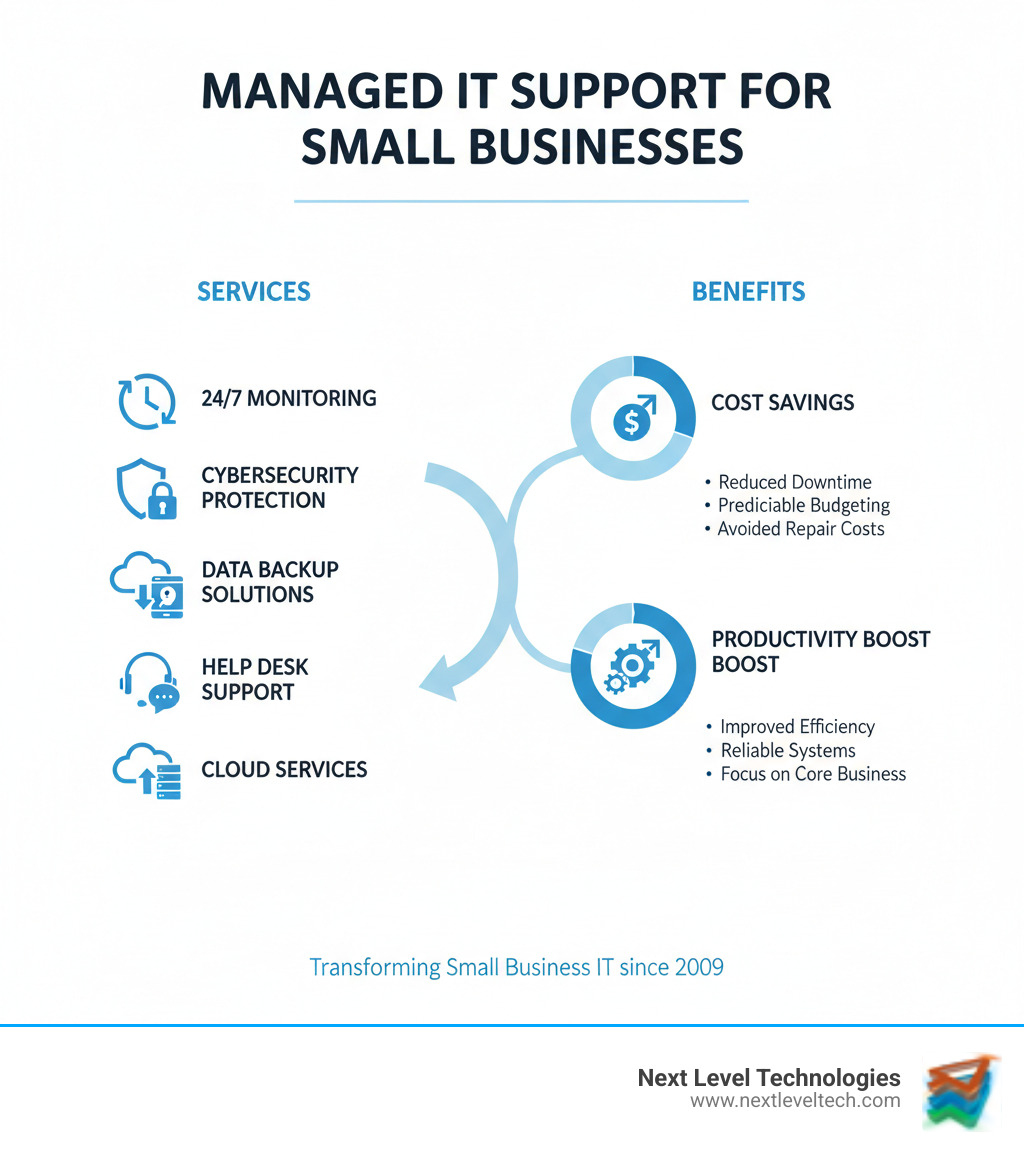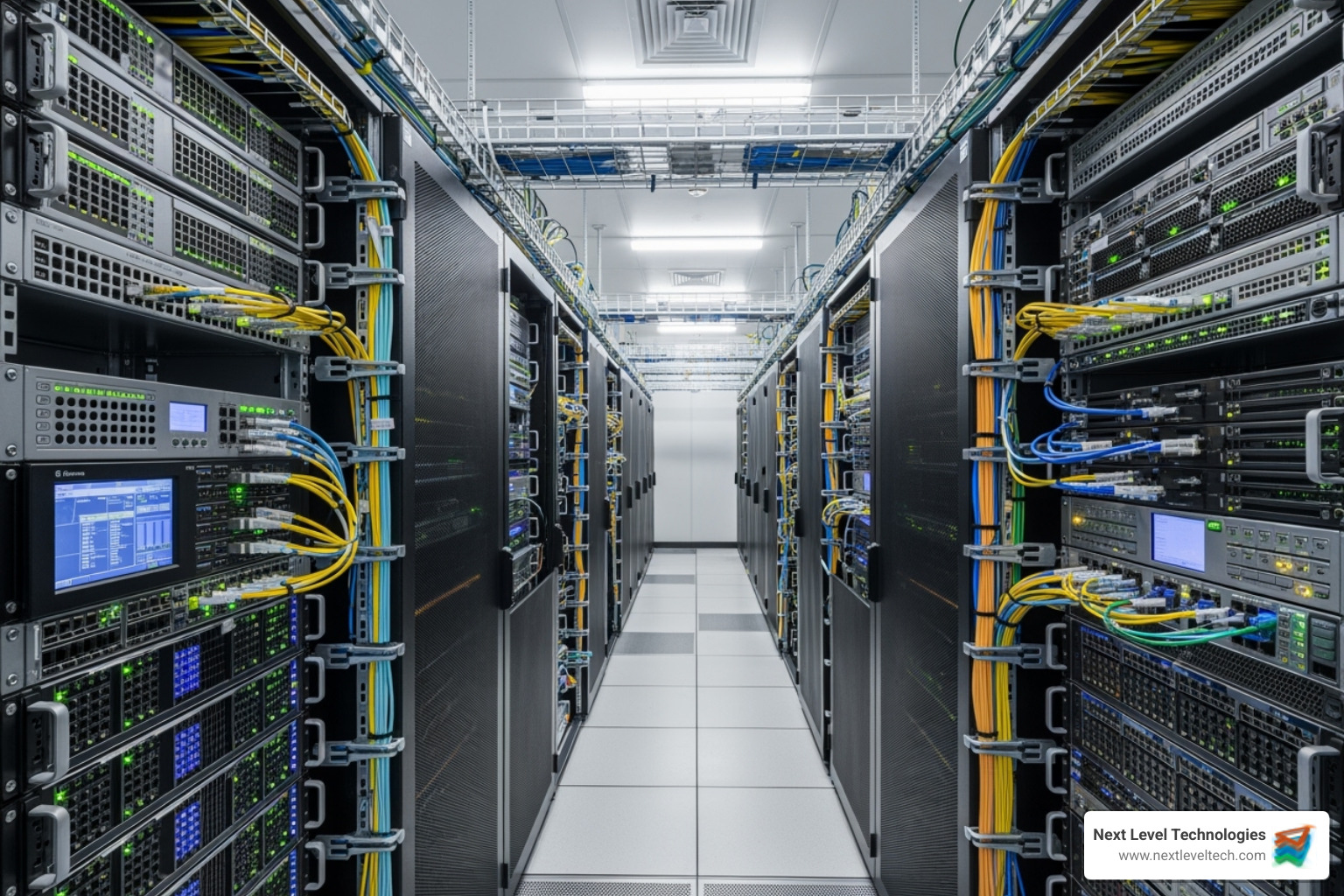The Ultimate Guide to IT Services for Small Businesses
September 30, 2025

Transform your IT! Discover how proactive IT support prevents issues, cuts costs, and secures your business for growth.
February 21, 2026

Discover the benefits of incident management to minimize costly downtime, boost customer trust, and ensure business continuity.
February 19, 2026

Elevate your business with proactive IT Support Charleston WV. Secure, cloud-powered solutions & local expertise for seamless operations.
February 18, 2026
September 30, 2025
IT Support for Small Businesses has become essential for survival in today's digital landscape. As one small business owner shared, "You literally saved our business," highlighting just how critical reliable technology support has become.
Quick Answer: What IT Support Should Small Businesses Look For?
Small businesses need enterprise-level technology to compete but often lack the resources for complex IT infrastructure. Downtime costs money, productivity, and reputation—yet many still take a reactive, break-fix approach to IT.
This guide will show you how the right IT partner can transform your technology from a constant headache into a competitive advantage. Modern IT support goes beyond fixing broken computers; it's about creating a robust, secure foundation that powers your business forward while protecting you from the cyber threats that target small businesses every day.
I'm Steve Payerle, President of Next Level Technologies, and I've been helping small and medium-sized businesses optimize their IT infrastructure since 2009. With locations in Columbus, Ohio and Charleston, WV, my team and I have seen how proper IT Support for Small Businesses transforms operations, reduces costs, and enables sustainable growth.

For small business owners, managing IT adds another layer of complexity to an already demanding job. Professional IT Support for Small Businesses transforms technology from a burden into a powerful asset, leveling the playing field and giving you access to the same advanced tools as larger competitors.
A key shift is moving from reactive "break-fix" support to a proactive managed IT services model. Instead of scrambling to fix a server crash or cybersecurity breach after it happens, proactive support anticipates and prevents these issues. This approach significantly reduces costly downtime that erodes productivity and profits, ensuring your systems run smoothly without unexpected interruptions.
Outsourcing your IT achieves significant cost savings compared to building an in-house team, which requires heavy investment in recruitment, salaries, and training. With managed IT services, you get a diverse team of experts for a predictable flat-rate monthly fee. This model costs far less than an internal team, freeing up capital for core business operations.
Beyond cost savings, outsourcing provides access to specialized expertise that's expensive to hire individually. Our team's extensive technical experience covers everything from network management to advanced cybersecurity. This gives you a competitive edge and allows you to focus on your core business, knowing your IT is in capable hands.
To explore this further, you might find our insights on 5 Reasons Why Your Business Needs Professional IT Services particularly helpful.
The cornerstone of effective IT Support for Small Businesses is proactive management. Instead of waiting for a critical system to fail, we employ continuous monitoring and maintenance to keep everything running smoothly.
Our managed IT services include 24/7 monitoring of your entire infrastructure—networks, servers, and devices. This constant oversight lets us detect potential issues before your team even notices. We implement automated patching to keep your systems updated with the latest security fixes and run regular health checks to identify vulnerabilities. This prevents problems from escalating into costly downtime.
For example, our systems can detect unusual network activity indicating a cyber threat or a failing hard drive before it crashes. This proactive approach minimizes interruptions and keeps your team productive, saving you significant time, money, and stress. Learn more about our general IT Support offerings.
As your small business evolves, your IT infrastructure must evolve with it. Effective IT Support for Small Businesses is about planning for tomorrow's growth, not just fixing today's problems. We help you plan for new employees, locations, or services.
Our approach includes future growth planning to ensure your IT solutions are scalable and flexible. We design systems that accommodate increased demand without a complete overhaul and use flexible service models that adjust as you grow. You never pay for more than you need but always have the capacity to expand.
Strategic IT planning helps you avoid technology bottlenecks that slow growth. Imagine onboarding new employees with their workstations and access already configured. That's the power of scalable IT. Our expertise in IT Infrastructure for Small Business helps you build a foundation that supports your ambitions.
When running a small business, technology should be an ally, not a headache. The right IT Support for Small Businesses transforms operations from firefighting into smooth workflows that help you grow.

Professional IT services are flexible building blocks for your digital foundation. Whether you're a five-person startup or a growing company, services can be customized to fit your needs and budget. Let's explore the essential services that keep small businesses running smoothly and securely.
Managed IT Services are like having a dedicated IT team without the overhead of hiring full-time staff. Instead of the old "break-fix" model, managed services keep your systems healthy around the clock.
Our proactive management approach means we monitor your network, servers, and devices 24/7. We spot trouble before it becomes a crisis, often resolving issues like slow software or a strained email server before your team even notices.
The help desk support component ensures your employees are never stuck. Whether someone in your Columbus office can't access a file or your Charleston team has printer troubles, help is a phone call away. Our staff's extensive technical experience means we resolve most issues quickly and remotely.
Network monitoring runs continuously, tracking everything from internet speed to security threats. We catch unusual activity that could signal a cyberattack, identify bottlenecks, and ensure all your systems communicate properly.
An often-overlooked benefit is vendor management. We handle conversations with your software, hardware, and service providers, coordinating everything from printer servicing to license renewals.
This all-inclusive model creates predictable monthly expenses, making budgeting easier and eliminating surprise repair bills. Learn more about our comprehensive Managed IT Services for Small Businesses.
Small businesses face the same cyber threats as large corporations but often lack the resources to defend themselves. Cybercriminals target smaller companies assuming their security is weaker. That's where our team's extensive cybersecurity training becomes your competitive advantage.
Modern threat detection goes beyond basic antivirus. We deploy sophisticated systems that analyze network traffic, identify suspicious behavior, and automatically block potential attacks, acting as a digital security team that never sleeps.
Firewalls and antivirus management create layered protection. Firewalls act as security checkpoints for network data, and combined with enterprise-grade antivirus, they form a strong defensive perimeter against malicious software.
Our employee security training teaches your team to recognize phishing emails and follow safe online practices. When everyone understands their role in security, your overall protection improves dramatically.
Data encryption protects sensitive information like customer records and financial data, making it unreadable to unauthorized users. Encryption keeps data safe whether it's stored on your servers or transmitted online.
For businesses in regulated industries, compliance standards like HIPAA are not optional. Our team helps you meet these obligations, such as strict data privacy rules, while maintaining efficient operations.
A single data breach can cost a small business thousands in recovery, legal fees, and lost customers. Professional cybersecurity services provide peace of mind that's worth far more than their cost. Dive deeper into our approach with IT Security Solutions for Small and Mid-Sized Companies.
Losing critical data from hardware failure, human error, or a cyberattack is a business owner's worst nightmare. Professional backup and disaster recovery services ensure this doesn't happen.
Automated backups run continuously, storing your data in multiple secure locations, including the cloud and on-premise devices. This redundancy ensures your data is protected even if one system fails.
Business continuity planning goes beyond backups. We help you identify critical systems and prioritize their recovery, so you know exactly what to restore first after a disaster to get running quickly.
The combination of cloud and on-premise solutions provides the best of both worlds. Cloud backups offer off-site protection and easy access, while local backups enable faster recovery of large amounts of data.
Recovery Time Objectives (RTOs) define how quickly systems must be restored after an incident. For example, email might have a one-hour RTO, while less critical systems can wait longer. Clear RTOs help prioritize recovery efforts.
Data loss prevention strategies catch problems before they become disasters. Regular testing ensures backups are working, and monitoring systems alert us to potential issues.
Whether you're dealing with a failed hard drive or a ransomware attack, comprehensive backup solutions keep your business operational. Explore our guides on Data Backup Solutions for Small Business and Cloud Backup for Small Business.
The cloud has revolutionized how small businesses operate, offering enterprise-level capabilities at affordable prices. Combined with remote support, cloud technology creates unprecedented flexibility.
Cloud migration moves your data and applications from on-site servers to secure cloud platforms, reducing hardware costs, improving reliability, and enabling remote access. Our team handles the technical complexities with minimal disruption.
Microsoft 365 administration optimizes this popular cloud platform. We manage user accounts, configure security, and help your team maximize tools like Outlook, Teams, and SharePoint, open uping powerful productivity features.
Scalable cloud infrastructure grows with your business. Adding new employees is as simple as creating new user accounts, and expanding to new locations doesn't require buying more servers.
Secure remote access allows our team to diagnose and resolve many IT issues without visiting your office. We can often fix problems within minutes, reducing downtime and keeping your team productive.
Remote support is especially valuable for our clients across Ohio and West Virginia. Whether you're in our main Columbus location or our Charleston office, distance never delays getting the help you need.
The combination of cloud services and remote support creates a modern, powerful, and flexible IT environment. Learn more about the benefits of Remote IT Support for Small Businesses.
Selecting the right IT Support for Small Businesses is a critical decision for your company's future. You're not just finding someone to fix computers; you're choosing a technology partner who will help shape your growth and protect your assets.

View this as a partnership, not a vendor arrangement. The right IT provider becomes an extension of your team, understanding your goals and helping you achieve them through smart technology choices. They will know your systems, anticipate needs, and be there when you need them.
Taking time to properly vet providers now can save you from costly mistakes, downtime, and security breaches later. A thorough evaluation ensures you're making an informed decision based on facts, not flashy sales presentations.
Our comprehensive guide on Top 7 Tips for Choosing the Best IT Company for Your Business walks you through this critical process in detail.
Before shopping for an IT provider, perform a self-assessment of your business's current state and future goals. Knowing your starting point is key to creating the right plan.
Start by evaluating your current infrastructure: your computers, servers, and software. Document which systems work well and which cause frustration.
Next, identify your biggest pain points, like slow internet, email outages, or cybersecurity worries. These frustrations highlight where professional IT support can make the biggest impact.
Consider your industry-specific requirements. Whether it's HIPAA for healthcare or data privacy rules for finance, a good IT provider should understand your industry's unique needs.
Future growth projections are crucial. Are you planning to hire more employees or open a second location? Your IT infrastructure should support these ambitions, not hold them back. The right provider will help you build systems that grow with you.
Be realistic about your budgetary constraints. Quality IT support is an investment, but it should fit your financial reality. A good provider will work with your budget to prioritize the most critical services first.
Our IT Consulting for Small Businesses service can help you work through this assessment if you need guidance.
When evaluating potential IT partners, look for providers who can demonstrate their expertise through concrete qualifications and proven results. Our team's extensive technical experience and cybersecurity training exemplify the kind of depth you should expect.
Industry certifications like CompTIA A+, MCSA, and CCNA demonstrate a foundation of credibility and show that technicians stay current with technology.
However, years of hands-on experience often matter more. Ask about the team's real-world experience with businesses like yours and the specific challenges your industry faces.
Case studies and testimonials offer valuable insights. Ask for references you can contact directly to get honest feedback from current clients.
Pay close attention to response time guarantees in Service Level Agreements (SLAs). These should specify how quickly to expect help for different issues, showing how seriously a provider takes your business continuity.
Issue resolution time is equally important. Fast response times don't mean much if problems take days to fix. Ask about average resolution times and how they minimize downtime.
Look for providers who track customer satisfaction scores and actively seek feedback. This demonstrates a commitment to service excellence.
Modern IT providers should use robust management systems like Connectwise to deliver consistent, efficient service. These platforms enable proactive monitoring, detailed reporting, and streamlined communication.
The most effective IT Support for Small Businesses uses a hybrid approach that maximizes the benefits of both onsite and remote support.
Remote support offers impressive advantages for many common IT issues. Technicians can often diagnose and resolve problems within minutes through secure remote access, getting your team back to work quickly. This approach is also more cost-effective. Whether your business is in Columbus, Ohio, Charleston, WV, or anywhere else, remote support provides immediate access to expertise.
But some situations require a physical presence. Installing new servers, setting up complex network equipment, or troubleshooting hardware problems often need hands-on attention. This is where local presence becomes invaluable. Having technicians who can be on-site when needed provides peace of mind.
Our teams in Columbus, Ohio, and Charleston, WV, exemplify this hybrid model. We start with remote resolution for quick fixes. When physical access is necessary, we dispatch experienced technicians who know your systems and can work efficiently on-site.
This flexible approach gives you the speed of remote support with the reliability of local, hands-on assistance. It's a key advantage of choosing Outsourced IT Services for Small Business over an internal-only approach.
A common question from small business owners is: "How much will IT Support for Small Businesses cost?" While balancing quality and budget is a concern, professional IT support is more affordable than many think, and its return on investment is substantial.
The key is understanding what you're actually paying for. When you invest in professional IT support, you're not just buying help when things break—you're purchasing peace of mind, productivity, and protection for your entire business.
Let's break down the real costs and help you understand what to expect when budgeting for IT support.
IT Support for Small Businesses typically comes in several pricing structures. Understanding these models helps you choose the right fit for your business.
Managed IT Services is the most comprehensive approach. For a predictable monthly fee (typically $500 to $5,000 for businesses with under 25 computers), you get complete IT management, including proactive monitoring, help desk support, and vendor management—like having an IT department without the overhead.
The per-user or per-device model ($100 to $500 per user/device monthly) is another popular option. It scales directly with your business size, making budgeting easy as you grow.
Break-fix support operates on an hourly basis, typically around $125 per hour. This reactive approach might seem cost-effective initially but often leads to unexpected expenses and costly downtime.
Tiered packages offer a middle ground, providing different service levels at various price points, from basic monitoring to comprehensive cybersecurity and cloud management.
The most important thing to remember is that cheaper isn't always better. Our team's extensive cybersecurity training and technical experience means you're investing in expertise that prevents costly problems before they happen.
Smart budgeting for IT Support for Small Businesses starts with understanding that technology costs are predictable and manageable when approached correctly.
Start with predictable monthly costs. Managed IT services eliminate guesswork from your budget. You'll know your exact IT support spend each month, making financial planning much easier.
Align your IT budget with your business goals. If you're planning to expand your team or open a second location, your IT needs will grow. Factor in additional licenses, equipment, and support. Our teams in Columbus, Ohio, and Charleston, WV, can help you plan for growth.
Don't forget hardware and software upgrades. While support covers maintenance, you still need to budget for equipment replacement and licensing. A good IT partner helps you plan these expenses to avoid large, unexpected bills.
Consider the hidden costs of downtime. When budgeting, factor in what it costs your business when systems are down. If your team of 10 averages $25 per hour, one hour of downtime costs $250 in lost productivity alone.
Think long-term. Quality IT support is an investment that pays dividends through better security, proactive maintenance, and boosted productivity. Viewing IT as an investment, not an expense, clarifies the budget conversation.
The goal isn't to find the cheapest IT support—it's to find the best value that protects your business and enables growth while fitting comfortably within your budget.
Transform your IT! Discover how proactive IT support prevents issues, cuts costs, and secures your business for growth.
February 21, 2026
Discover the benefits of incident management to minimize costly downtime, boost customer trust, and ensure business continuity.
February 19, 2026
Next Level Technologies was founded to provide a better alternative to traditional computer repair and ‘break/fix’ services. Headquartered in Columbus, Ohio since 2009, the company has been helping it’s clients transform their organizations through smart, efficient, and surprisingly cost-effective IT solutions.
